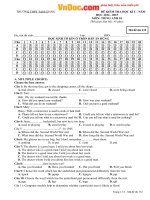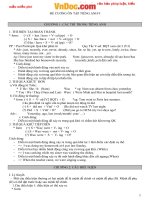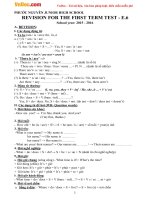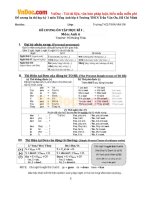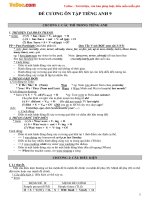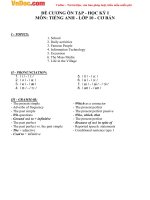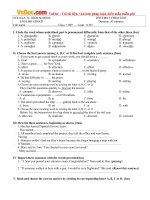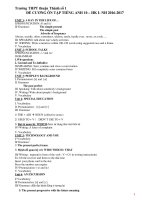Đề cương ôn thi học kì 1 môn Tiếng Anh lớp 10 trường THPT Chu Văn An, Hà Nội năm 2015 - 2016
Bạn đang xem bản rút gọn của tài liệu. Xem và tải ngay bản đầy đủ của tài liệu tại đây (584.11 KB, 14 trang )
VnDoc - Tải tài liệu, văn bản pháp luật, biểu mẫu miễn phí
ĐỀ CƯƠNG ÔN TẬP - HỌC KỲ I
MÔN: TIẾNG ANH - LỚP 10 - CƠ BẢN
I - TOPICS:
1. School
2. Daily activities
3. Famous People
4. Information Technology
5. Excursion
6. The Mass Media
7. Life in the Village
II - PRONUNCIATION:
1. / i / - / i: /
2. / ʌ / - / a: /
3. / e / - / æ /
4. / ɒ / - / ɔ: /
III - GRAMMAR:
- The present simple
- Adverbs of frequency
- The past simple
- Wh-questions
- Gerund and to + infinitive
- The past perfect
- The past perfect vs. the past simple
- The + adjective
- Used to + infinitive
5.
6.
7.
8.
/ Ʊ / - / u: /
/ ə / - / з: /
/ ei / - / ai / - / ɔi /
/ aƱ / - / əƱ /
- Which as a connector
- The present perfect
- The present perfect passive
- Who, which, that
- The present perfect
- Because of and in spite of
- Reported speech: statements
- Conditional sentence type 1
VnDoc - Tải tài liệu, văn bản pháp luật, biểu mẫu miễn phí
ĐỀ CƯƠNG ÔN TẬP - HỌC KỲ I
MÔN: TIẾNG ANH - LỚP 10 - NÂNG CAO
I - TOPICS:
1. School Talks
2. People’s Backgrounds
3. Daily Activities
4. Special Education
5. Technology
6. School Outdoor Activities
7. The Mass Media
II – WORD STUDY:
- Words of the same family
- Compound adjectives
- Nouns functioning as adjectives
- Adjectives used as nouns
- Prefixes
- Words that goes together
- Associated words together
III - GRAMMAR:
- Gerund – to-infinitive
- Wh-questions
- Tenses
- Used + to infinitive
- Reported speech
- Will vs. be going to
IV - WRITING
- Narrative
- Summary
- Letters: complaint, confirmation
- Registration form
- Instructions
- Advantages and disadvantages of the mass media.
VnDoc - Tải tài liệu, văn bản pháp luật, biểu mẫu miễn phí
Bài tập tham khảo
PHONETICS
1. Circle the letter a, b, c, or d to choose the word that has the underlined (letters) pronounced differently
from the others.
1. a. received
b. worked
c. obtained
d. harbored
2. a. hard
b. start
c. party
d. talk
3. a. rubbish
b. suburb
c. lunch
d. consume
2. Circle the letter a, b, c, or d to choose the word whose main stress is placed differently from the others.
1. a. vision
b. technology
c. steadily
d. signal
2. a. silence
b. register
c. manual
d. interpreter
VOCABULARY
1. Use the correct forms of the given words to complete the following sentences.
1. I like to learn English best because it is a(n) ………………………… language. (nation)
2. Marie was awarded a Nobel prize for ………………………… the atomic weight of radium. (determine)
3. We want to visit some caves near Hanoi as we have recently studied rock ………………………… (form)
4. What makes a computer a ………………………… device? (miracle)
5. The founding of the Radium Institute in1914 made Marie’s ……………………….. wish come true. (human)
2. Complete each sentence with an appropriate word. (5m)
1. Although it’s a long day for us, we are ………………………… with what we do.
2. Marie Curie’s real joy was “………………………… human suffering”.
3. Pham Thu Thuy students are deaf, dumb and mentally …………………………
4. Computer can add, subtract, multiply, and divide with lightning speed and perfect …………………………
5. As a brilliant and mature student, Marie ………………………… the dream of a scientific career.
GRAMMAR AND STRUCTURE:
Circle the letter a, b, c, or d to choose one word or phrase that best completes the sentence.
1. I didn't like it in the city at first. But now …… here.
a. I got used to living
b. I used to living
c. I'm used to live
d. I used to live
2. In spite of ……, we decided to go out.
a. we felt very tired
b. feeling tired
c. all of us felt tired
d. tired
3. I remember An …… rode the bus to school with.
a. I
b. who I
c. which I
d. that I
4. Rick left the party early because he …… a headache
a. had
b. has
c. used to have
d. was having
5. Nobody ventured outdoors …… the hurricane warnings.
a. despite
b. although
c. because of
d. because
6. We've given up …… to persuade them ……
a. trying/ changing
b. trying/ to change
c. to try/ changing
d. try/ to change
7. We received her letter after she …… to a new house.
a. had moved
b. has moved
c. was moving
d. would move
8. The government is doing nothing to help ……
a. the poor people
b. the poor ones
c. the poor
d. the pours
9. The police officer stopped us and asked us where ……
a. were we going
b. are we going
c. we are going
d. we were going
10. The street is very noisy, …… makes sleeping difficult.
a. that
b. what
c. which2. Circle the letter a, b, c, or d to choose the
word whose main stress is placed differently from the others.
d. it
VnDoc - Tải tài liệu, văn bản pháp luật, biểu mẫu miễn phí
11. Are you looking forward …… on your business trip?
a. you go .
b. going
c. to going
d. to go
12. This is the first time we …… to Scotland so it's all new to us.
a. are going
b. we’re
c. have been
d. will go
13. I'll give you a map ……
a. in order for you find the way all right.
b. so that you will find the way all right.
c. in order that you can find the way all right.
d. b and c are correct
14. Goodnight. I …… you in the morning.
a. see
b. am seeing
c. am going to see
d. will see
15. I …… at six o'clock, but …… to be up by five.
a. normally get up/ I have sometimes
b. normally get up/ sometimes I have
c. get normally up/ sometimes I have
d. get normally up/ I sometimes have
WRITING. Complete the second sentence so that it has a similar meaning to the first.
1. The flat's very noisy but we enjoy living there.
Even ……………………………………………………………………………………………………………
2. In spite of all our warnings, he left camp without taking his rifle.
Although ………………………………………………………………………………………………………
3. No-one has challenged his authority before.
This is the first time ……………………………………………………………………………………………
4. John and Mary moved to Edinburgh twenty years ago.
It is………………………………………………………………………………………………………………
5. "I think you should go by train," he told us.
He advised ………………………………………………………………………………………………………
6. "Where is the nearest tube?" she asked.
She enquired ……………………………………………………………………………………………………
7. He lost his money simply because he wasn't careful.
If ………………………………………………………………………………………………………………..
8. "Don't forget to phone the office," she told him.
She reminded …………………………………………………………………………………………………..
9. I started work for the company a year ago.
I've been …………………………………………………………………………………………………………
10. How long is it since they bought the house?
When …………………………………………………………………………………………………………….
READING
1. Circle the letter a, b, c, or d to choose one word or phrase to complete the passage
There is only one shop in the village, but (1) …… everything. (2) …… newspapers and books, you can buy
such things as clothing, household goods and furniture. There is (3) …… post office in one corner. The trouble is
that the man (4) …… the shop is a very unpleasant person. His clothes are dirty, he is unshaven, and worst of all,
he is (5) …… to his customers.
1. a. it seems to sell
b. it likes to sell
c. they can buy
d. there has
2. a. Because of
b. And
c. As well as
d. More than
3. a. at last a
b. both a
c. something for a
d. even a
4. a. it is his
b. who runs the
c. for managing the
d. whose
5. a. not very fond
b. seldom impolite
c. often quite rude
d. nearly very angry
VnDoc - Tải tài liệu, văn bản pháp luật, biểu mẫu miễn phí
2. Fill in each blank with a suitable word from the list given.
A According to
B bring about
C coverage
D designed
E entertainment
F established
G events
H fun
I In addition to
J make
K means
L pictures
M purposes
N Through
O Throughout
Television is one of man's most important 1. …………………… of communication. It brings
2. …………………… and sounds from around the world into millions of homes. A person with a television set
can sit in his house and watch the President 3. …………………… a speech or visit a foreign country. He can see a
war being fought and watch statesmen try to 4. …………………… peace. 5. …………………… television, home
viewers can see and learn about people, places, and things in faraway lands. TV even takes its viewers out of this
world. It brings them 6. …………………… of America's astronauts as the astronauts explore outer space.
7. …………………… all these things, television brings its views a steady stream of programs that are
8. …………………… to entertain. In fact, TV provides many more 9. …………………… programs than any
other kind. The programs include action-packed dramas, light comedies, sporting 10. …………………… and
motion pictures.
3. Read
the passage then mark the statements T (TRUE), F (FALSE) or NG (NOT GIVEN).
On April 14, 1868, two ships were scheduled to leave the busy port of New York, bound for Europe. The
night before, their captains met and had dinner together. The dinner was very ordinary and certainly neither man
knew he would soon have a role in one of the world's greatest mysteries.
The two ships left the next morning. Their names: the Dei Gratia and the Marie Celeste. After several
days at sea, Morchouse, the captain of the Dei Gratia, sighted the Marie Celeste, and he immediately recognised
that something was wrong. It was not moving and there was no sign of life on deck. Morehouse and a few of his
men took a small boat to the Marie Celeste to investigate. They searched every part of the ship and found nothing not a man, dead or alive, no sign of illness or combat, no disruption. In fact, everything was in good order, as if the
crew had left ten minutes before. There was a ten-pound note on a table, with an unfinished letter home near it, a
freshly washed stack of clothes in the laundry, and plenty of food and water. These signs of normal, everyday life
on an empty ship were the strangest feature of the mystery. What had happened to the captain and crew? If they
had been attacked, why was everything still in its place and why were there no signs of a struggle? If they had died
suddenly from a disease, where were their bodies?
Investigators searched for the answers to these questions for years and years, but they came up with
nothing. The fate of the men of the Marie Celeste remains as one of the unanswered questions of our time.
…… 1. The captains of the Dei Gratia and the Marie Celeste planned their meeting at sea on the day before their
departure.
…… 2. They had a big meeting and finished very late that night.
…… 3. The two ships set sail for Europe on the same day.
…… 4. Captain Morehouse was not surprised to see the Marie Celeste unoccupied.
…… 5. The crew of the Dei Gratia completed a thorough search of the Marie Celeste.
…… 6 The captain of the Marie Celeste left a letter explaining what had happened.
…… 7. The captain and crew had left 10 minutes before for a special mission.
…… 8. The crew of the Marie Celeste had used all their food and water and died of starvation.
…… 9. Morehouse and his men were mystified to find the contents of the Marie Celeste undisturbed.
…… 10. Later investigations finally solved the mystery of the Marie Celeste.
VnDoc - Tải tài liệu, văn bản pháp luật, biểu mẫu miễn phí
ĐỀ CƯƠNG ÔN TẬP - HỌC KỲ I
MÔN: TIẾNG ANH - LỚP 11 - CƠ BẢN
I - TOPICS:
1. Friendship
2. Personal Experience
3. A Party
4. Volunteer Work
5. Competitions
6. World Population
7. Celebrations
II - PRONUNCIATION:
1. / dʒ / - / tʃ / / iə / - / eə / - / Ʊə /
2. / m / - / n / - / η /
3. / l / - / r / - / h /
4. / w / - / j /
III - GRAMMAR:
- Infinitive with / without to
- Present simple indicating past time
- Tenses revision: Past Simple, Past
Progress, Past Perfect
- Infinitive and Gerund
- Passive infinitive and gerund
- Gerund and present participle
5. / kl / - / gl / - / kr / - / gr / - / kw /
6. / fl / - / fr / - / θr /
- Perfect gerund and perfect participle
- Reported speech with to infinitive
- Reported speech with gerund
- Conditional type 1, 2, 3
- Conditional in reported speech
- Pronouns one(s), someone, anyone, no
one, everyone
VnDoc - Tải tài liệu, văn bản pháp luật, biểu mẫu miễn phí
ĐỀ CƯƠNG ÔN TẬP - HỌC KỲ I
MÔN: TIẾNG ANH - LỚP 11 - NÂNG CAO
I - TOPICS:
1. Friendship
2. Personal Experience
3. Parties
4. Volunteer Work and Illiteracy Programs
5. Competitions
6. Population
7. Celebrations
8. Postal and Telecommunications Services
II – WORD STUDY:
- Descriptive adjectives
- Sense verbs
- Compound Nouns: N + N
- Adjectives Derived from Nouns
- Nouns derived from Verbs
- Fractions
- Genitives ’s
- Words Used in Computing and Telephoning
III - GRAMMAR:
- Verb from review
- Linking words
- Modal perfect
- Bare infinitive or to infinitive
- Reported speech
- Gerund and present participle
- Perfect gerund and perfect participle
- Restrictive relative clauses
- Non-restrictive relative clauses
- Conditional sentences
- Pronouns
- Indirect speech with conditional sentences
IV - WRTING
- Narrative
- Letters: past experience, invitation & respond, thank you, ask & give
information, complaint
- Describing trends in graphs
- Proposal for a celebration activity
VnDoc - Tải tài liệu, văn bản pháp luật, biểu mẫu miễn phí
Bài tập tham khảo
1. Phonetics: Choose the word whose underlined part is pronounced differently from that of the others.
1. A. nothing
B. purpose
C. welcome
D. compare
2. A. measles
B. tease
C. please
D. measure
3. A. especially
B. weather
C. exercise
D. bench
4. A. thus
B. with
C. smooth
D. maths
5. A. naked
B. practiced
C. wanted
D. wicked
6. A. encourage
B. problem
C. excellent
D. possible
7. A. curiosity
B. cure
C. business
D. during
8. A. many
B. habit
C. apple
D. happy
9. A. bear
B. hear
C. ear
D. clear
10. A. young
B. cousin
C. couple
D. thorough
2. Modals: Choose the most suitable words underlined.
1. That can’t have been / shouldn’t have been Nick that you saw.
2. You had to give / might have given me a hand.
3. I caught the later train because I had to see / must have seen a client.
4. I suppose Bill should have lost / might have lost his way.
5. I didn’t refuse the cake, as it must have been / would have been rude.
6. I don’t know who rang, but it could have been / must have been Jim.
7. It was odd that you should have bought / would have bought the same car.
8. I asked them to leave but they couldn’t / wouldn’t go.
9. It’s a pity you didn’t ask because I could help / could have helped you.
10. It’s your fault, you can’t have / shouldn’t have gone to bed so late.
3. Word form:
Congratulations to all involved with the school (1. produce) of The Woman Next 1. ……………………..
Door. The (2. advertise) was carried out by the Art Department, and the posters 2. ……………………..
were very (3. imagine). We certainly have some very (4. art) students in our school! 3. ……………………..
Many people helped with building and painting the (5. scene) and the play was 4. ……………………..
written by the English Department, who managed to create an (6. amuse) story, with 5. ……………………..
excellent songs. The music was written by Sue Porter, who also (7. company) the 6. ……………………..
singers on the piano. Everyone enjoyed a thoroughly (8. entertain) evening, and 7. ……………………..
there was a long round of (9. applaud) at the end. Jim Barrett gave a brilliant 8. ……………………..
performance as Sergeant Moss, and Liz Aiken was a (10. delight) Mrs. Jump. Well- 9. ……………………..
done everyone!
10. ……………………..
4. Complete each sentence with one of the words given:
appreciate, follow, mislead, put, utter, express, imply, plead, spot, wonder
1. I don’t know how to ………..….…………. this, but I’m afraid the money has gone.
2. Could you say that again? I didn’t quite ………..….…………. you.
3. I would ………..….…………. it if you could help me with this job.
4. I was so flabbergasted that I couldn’t ………..….…………. a single word.
5. I simply said we had lost the order. I didn’t ………..….…………. that it was your fault.
6. I was so overwhelmed that I just couldn’t ………..….…………. my feelings.
7. Whenever I ask you about damage to the car, you always ………..….…………. ignorance.
8. I ………..….…………. that you can get up at 6.00 after what you were doing last night.
9. Most of the clues in a detective story are there to ………..….…………. the reader.
VnDoc - Tải tài liệu, văn bản pháp luật, biểu mẫu miễn phí
10. Did you ………..….…………. the deliberate mistake on page two?
5. Reading
Bill Jarvis took over our village news agency at time of life when most of us only want to relax. He just
thought he would like something but not too much to do, and the news agency was ready-made. The business
produced little enough for him, but then Bill was a chap who only wanted the simplicity and order and regularity of
the job. He had been a long-serving sailor, and all his life had done everything by the clock.
Every day he opened his shop at six am to catch the early trade; the papers arrived on his door-step before
that. Many of Bill's customers were city workers, and the shop was convenient for the station. Business was tailing
off by ten o'clock, so at eleven sharp Bill closed for lunch. It was hard luck on anybody who wanted a paper or
magazine in the afternoon, for most likely Bill would be down on the river bank, fishing, and his nearest
competitor was five kilometres away. Sometime in the afternoon, the evening papers landed on the door-mat and at
four o'clock Bill reopened. The evening rush lasted till seven, and it was worthwhile.
He lived in a flat above the shop, alone. Except in very bad weather, you always knew where to find him in
the afternoons, as I have said. Once, on a sunny afternoon, I walked home along the river bank from a shopping
trip to the village. By my watch it was three minutes past four, so I was astonished to see Bill sitting there on his
little chair with a line in the water. He had no luck, I could see, but he was making no effort to move.
"What's wrong, Bill?" I called out from the path. For answer, he put a hand inside his jacket and took out a
big, golden object. For a moment I had no idea what it could be, and then it suddenly went off with a noise like a
fire engine. Stopping the bell, Bill held the thing up and called back: "Ten to four, you see, and this is dead right."
He stood up then and began to wind in his line. I had never known anyone carry a brass alarm clock round with
him or her before.
1. Bill Jarvis became a newsagent when ________
A. He needed the money.
B. He was quite an old man.
C. He decided to take things easy.
D. He gave up clock repairing.
2. What does the passage tell us about the news agency?
A. It was an easy job with fixed hours.
B. It was a very profitable business
C. It was opened specially for Bill Jarvis
D. It belonged to the railway and was part of the station.
3. Why did Bill open the shop so early in the day?
A. He liked to do as much as possible before he went to work.
B. Bill was never sure of the time.
C. The shop had to be open when the morning papers came
D. It was then that he did a lot of business.
4. We understand from the passage that the shop closed for lunch ________
A. At eleven o'clock more or less.
B. At exactly eleven o'clock.
C. Before eleven o'clock.
D. Always after eleven o'clock.
5. You might say "hard luck" to someone who ________
A. has just heard some very good news.
B. puts great effort into whatever he or she tries.
C. is less fortunate than he or she ought to be.
D. fails through his or her own fault entirely.
6. Why was the writer on the riverbank that afternoon?
A. He was going to do some shopping in the village.
B. He was fishing.
C. He was going to get the evening paper.
D. He was on his way home from the village
7. Why was the writer surprised when he saw Bill Jarvis?
A. He thought it was late for Bill to be still fishing.
B. Bill had not caught anything, and that seemed strange.
C. He thought Bill was ill, because he was not moving at all
D. He was surprised because Bill stayed in his flat in the afternoons.
8. From the information given in the passage, who- or what - do you think was wrong?
A. The bell was; it must have gone off at the wrong time. B. The writer's watch was fast.
C. Bill was; he had dropped off to sleep
D. Bill's clock was wrong; it was very old.
9. All of the following are true about Bill Jarvis EXCEPT __________
A. he lived alone
B. He had ever worked as a sailor
C. He was a newspaper man D. Fishing was his past time
10. What did Bill Jarvis often bring with him when he went fishing?
A. a clock
B. a gold
C. a newspaper
D. a fire engine
VnDoc - Tải tài liệu, văn bản pháp luật, biểu mẫu miễn phí
ĐỀ CƯƠNG ÔN TẬP - HỌC KỲ I
MÔN: TIẾNG ANH - LỚP 12 - CƠ BẢN
I - TOPICS:
1. Home Life
2. Culture Diversity
3. Ways of Socializing
4. School Education System
5. Higher Education
6. Future Jobs
7. Life in the Future
II - PRONUNCIATION:
1. The pronunciation of ending ‘s’
2. The pronunciation of ‘ed’ ending
3. Stress in two-syllable words
4. Stress in three-syllable words
5. Stress in more than three-syllable words
6. Weak/Strong forms of some conj. & prep.
7. Contracted forms of auxiliaries
III - GRAMMAR:
- Tenses revision
- Report speech
- Passive voice
- Conditional sentences
- Relative clauses
- (Al)though / even though
- Prepositions and articles
VnDoc - Tải tài liệu, văn bản pháp luật, biểu mẫu miễn phí
ĐỀ CƯƠNG ÔN TẬP - HỌC KỲ I
MÔN: TIẾNG ANH - LỚP 12 - NÂNG CAO
I - TOPICS:
1. Home Life
2. Cultural Diversity
3. School Education System
4. Higher Education
5. Future Jobs
6. Economic Reforms
7. Youth
8. Future Life
II – WORD STUDY:
- Word combinations with home & house
- Negative Prefixes
- -edly adverbs
- Make & do
III - GRAMMAR:
- Present Simple expressing routine
- Reported speech: Statements & questions
- Tenses review
- Passive voice
- Prepositions after verbs
- Adverb clauses of places
- Suffixes
- Compound adjectives: Adj. + N
- Compound adjectives: N + Adj.
- Conditional sentences
- Relative clauses (restrictive & nonrestrictive)
- Prepositions of time & place
- Articles
- Sentences with although, eventhough,
despite, in spite of
IV – WRITING
- A letter to tell about home rules.
- A paragraph a bout typical product of a culture
- Vietnamese students’ educational parth
- Filling out an application form
- A letter of aplication
- Information from a gap
- An agenda
- Paragraph about life in future
VnDoc - Tải tài liệu, văn bản pháp luật, biểu mẫu miễn phí
Bài tập tham khảo
I.PHONETICS:
A. Choose the word with the different pronunciation of the underlined part.
1. A. sweet
B. sword
C. swim
2. A. soccer
B. subject
C. surface
3. A. scuba
B. suitable
C. conclusion
B. Choose the word with the different stress pattern
4. A. energetic
B. scientific
C. competitor
5. A. opponent
B. vertical
C. podium
D. swamp
D. pleasure
D. enthusiast
D. entertainment
D. wilderness
II. VOCABULARY:
6. I am so busy that I have only had time to ______ into the report.
A. dip
B. read
C. look
D. plunge
7. Your ______ is the one you are playing or fighting against in a game.
A. player
B. enemy
C. opponent
D. teammate
8. You should allow a little time after a meal for the food to ______.
A. absorb
B. consume
C. digest
D. nourish
9. It is announced that foul play will be severely ______.
A. fined
B. penalized
C. scolded
D. blamed
10. Romeo and Juliet is a famous ______ by William Shakespeare.
A. romance
B. thriller
C. fiction
D. cartoon
th
11. FIFA has declined that South Africa will ______ the 19 World Cup in 20010.
A. arrange
B. manage
C. organized.
D. host
12. He knew by heart the ______ of the note his wife left for him on the table.
A. plot
B. title
C. content
D. information
13. The excited people in the stadium burst out shouting as the footballer missed the penalty.
A. spectators
B. audiences
C. viewers
D. witnesses
14. I ______ the new English book to all my classmates so that they can buy it.
A, displayed
B. commented
C. introduced
D. recommended
15. My younger brother is a very ______ boy, always playing active games.
A. heavy
B. strong
C. energetic
D. powerful
III.GRAMMAR
16. Your car is so dirty. I do not think you have it ______ very often.
A. wash
B. washed
C. be washed
D. to be washed
17. The more he tried to help her, ______ she seemed to like it
A. more
B. less
C. the less
D. the least
18. The man died because medical help was not summoned. A doctor ______ called immediately.
A. must have
B. should have
C. must have been
D. should have been
19. You hair is too long. It needs ______.
A. cutting
B. to cut
C. being cut
D. to be cutting
20. I ______ Mary ______ bracelet for her birthday.
A. bought/ a
B. bought/ the
C. bought for / a
D. bought for/ the
21. Do you know ______ the story had a happy end?
A. does
B. did
C. if
D. has
22. Athletes taking part in the international games should be proud of ______.
A. oneself
B. yourself
C. himself
D. themselves
23. The old man serves the ball so skillfully. He ______ a good tennis player when he was young.
A. can be
B. could be
C. must be
D. must have been
24. Sometimes a book can help change history. One book that certainly ______ Uncle Tom’s Cabin, written
by Harriey Beeches Stow.
A. did was
B. did that
C. did it
D. did were
25. The athlete would have won the gold medal ______ not fallen over.
A. if
B. if he
C. had he
D. unless he had
IV USE OF ENGLISH
Choose the correct sentence which has the same meaning as the given one.
26. When the unemployment rate is high, the crime rate is usually also high.
A The high rate of unemployment depends on the high rate of crime.
VnDoc - Tải tài liệu, văn bản pháp luật, biểu mẫu miễn phí
B The higher the unemployment rate is, the higher the crime rate is.
C The unemployment rate and the crime rate are both higher.
D The unemployment rate is as high as the crime rate.
27. In population, Los Angeles is not as big as New York.
A New York is bigger than Los Angeles in population.
B New York is not as crowded as Los Angeles.
C Los Angeles is more densely-populated than New York.
D New York is bigger than Los Angeles.
28. Mary would rather see more historic sights than go dancing.
A Mary would like to see historic sights and go dancing.
B Mary likes historic sights when she cannot go dancing.
C Mary would prefer to see more historic sights rather than go dancing
D Mary had better see more historic sights.
29. It has been said that UFO sightings are increasing.
A People say that UFO sightings ate increasing.
B People have said that UFO sightings are increasing.
C That UFO sightings are increasing is true.
D UFO has been said to be increasing.
30. Many people argue that most UFO sightings are caused by unusual weather conditions.
A According to many people, unusual weather conditions cause most UFO sightings.
B Many people argue that most UFO sightings are forecast by unusual weathermen.
C Many people argue that most UFO sightings resulted from unusual weather forecast.
D Most UFO sightings are caused by arguments about unusual weather conditions.
READING COMPREHENSION
Choose the word which bests fits each gap of the passage.
The second (31) ______ Olympics sport is swimming although there (32) ______ no swimming in the ancient
Olympics. The first 50-metre pool was used in 1924 and the first pool inside was used in 1948. Now the pools
are always very modern and the race can be (33) ______ to 0.0001 seconds.
The USA ‘s Mark Spitz is the most successful Olympics swimmer of all time. N Munich in 1972, he won
seven gold medals-a record (34) ______ in one Games. Together with swimming is water polo, which is hard,
fast and exciting. And here is diving, which is very beautiful to watch. One of the events is from 10 meters
above the pool, the same as (35) ______ from the top of a house.
26.
A. big
B. bigger
C. more big
D. biggest
27.
A. is
B. are
C. was
D. were
28.
A. count
B. counted
C. time
D. timed
29.
A. award
B. number
C. reward
D. present
30.
A. diving
B. rowing
C. running
D. sailing
Read the passage and choose the best answer.
I am a real bookworm and I love to browse in bookshops, just looking briefly at one book after another. I look
at the illustrations, the photos or drawings. If there are foreign or technical words in the book, I look at the
glossary at the back for their meanings (unless they are explained in footnotes at the bottom of the pages) and I
look at the bibliography also at the back, which is a list of other books on the same subjects.
I use the library a lot. I borrow two or three books a week and I have to pay a fine if I return them late. Friends
often recommend books to me and I also read book reviews in the newspapers. I don not always agree with
them, but anyway they let me know what new books are being published.
31. What does the writer mean by I’m a real bookworm?
A. His hobby is going to bookshops.
B. He loves reading books very much.
C. He spends most of his free time in bookshops.
D. He often looks for worms in books.
32. The glossary
A. helps him find the meanings of special words in the book.
B. is either at the back of the book or at the bottom of the pages.
C. can be used instead of a workbook.
D. gives readers’ opinion of a book.
33. The underlined word them in the passage refers to
A. his friends.
B. the books on the same subject.
C. The librarians.
D. The books he borrows from the library.
34. The underlined phrase a fine means
A. the punishment given to someone.
VnDoc - Tải tài liệu, văn bản pháp luật, biểu mẫu miễn phí
B. The amount of money paid for a service.
C. A sum of money taken from someone as a punishment.
D. A sum money paid for the use of something.
40.Which of the following sentences is TRUE?
A. He spends a lot of time in bookstores, but he does not often buy books.
B. He seldom goes to bookshops.
C. He spends all of his savings buying books.
D. He likes reading foreign and technical books the most.
Finish each of the following sentences in such a way that it means exaclly the same as the
sentence printed before it.
Exercise 1
1. “Why hasn't Peter phoned?” she wondered.
She wondered ..............................................................................................................................................
2. I'm only interested in why he did it.
The only thing ..............................................................................................................................................
3 He tried to escape but the police stopped him.
The police prevented him .....................................................................................................................
4 She has ordered a new outfit from her dressmaker.
She is having ..............................................................................................................................................
5 Couldn't you find a better hotel?
Is this ................................................................................................................................................................
6 John began playing the piano ten years ago.
John has ..........................................................................................................................................................
7 They won't be able to come on Sunday.
It will be .........................................................................................................................................................
8 She needs to study harder.
She doesn't .....................................................................................................................................................
9 I only paid a few hundred pounds for the car.
The car ............................................................................................................................................................
10 My mother made these curtains.
These curtains ..............................................................................................................................................
